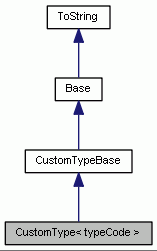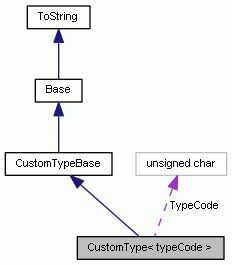template<nByte typeCode>
class ExitGames::Common::CustomType< typeCode >
The CustomType class provides you with an interface, to add support for additional data-types.
We only support a certain subset of Datatypes out of the box. If you need support for further datatypes, then you can easily add this support yourself by subclassing this class template and providing suitable implementations for the pure virtual functions, which are inherited from CustomTypeBase, in your subclass. You should only subclass every typecode once. typeCode 0 should be considered as reserved. So your first custom type would inherit from CustomType<1>, the second one from CustomType<2> and so on. Subclassing the same typecode multiple times will lead into undefined behavior as the typecode will determine the class as instance of which serialized data should be interpreted.
- Remarks
- When you are subclassing a specialization of CustomType, then you will also have to subclass the according specialization of CustomTypeFactory (the one for the same typecode).
- See also
- CustomTypeBase, CustomTypeFactory
§ constructClass()
This static function initializes the class and has to be called once before any instance of a concrete subclass gets created. It registers the typecode and sets the factory-class to a copy of the passed parameter.
- See also
- deconstructClass()
- Parameters
-
| factory | an instance of the factory class, which will be used to create instances of this class |
§ deconstructClass()
| void deconstructClass |
( |
void |
| ) |
|
|
static |
This static function cleans up the class and has to be called once after the last instance of a concrete subclass has been deallocated. It will then deallocate the shared instance of the according CustomTypeFactory subclass.
- See also
- constructClass()
§ TypeCode
Check this public constant to find out the typecode of a custom type at runtime. This should normally not be of any interest.
 Photon C++ Client API
4.1.12.2
Photon C++ Client API
4.1.12.2


 Static Public Member Functions inherited from Base
Static Public Member Functions inherited from Base Public Member Functions inherited from CustomTypeBase
Public Member Functions inherited from CustomTypeBase Public Member Functions inherited from Base
Public Member Functions inherited from Base Public Member Functions inherited from ToString
Public Member Functions inherited from ToString